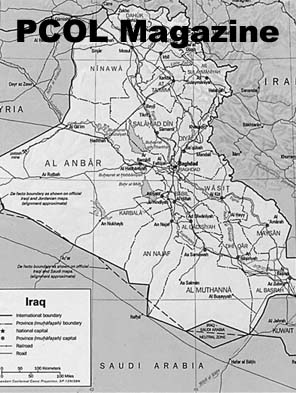
RPCV Tom Maertens says Support the troops by bringing them home
Support the troops by bringing them home
By Tom Maertens
Special to The Times
Few Americans would seriously argue that we are winning the war on terrorism. Instead of pursuing Osama bin Laden and al-Qaida, we have become bogged down in a war against Iraqi extremists.
These are not the people who attacked us on 9-11.
American tactics in Iraq are increasing support for Muslim extremists everywhere. The U.S. military reacted to the killing and mutilation of four American contract workers in Fallujah by using gunships and U.S. Marines against a mosque and Iraqi civilians.
The fighting that resulted looks like a popular uprising uniting traditional Sunni and Shiite enemies against us. George W. Bush is a uniter after all.
It doesn't take a lifelong student of Arab-Muslim societies to understand that these people are seething with hatred for the United States. As would anyone who has been unjustly attacked, they want revenge. One need look no further than the attacks of 9-11 to understand this.
U.S. success in Iraq had been predicated on the majority Shiites remaining neutral. This isn't happening.
The typical dynamics of a quasi-revolutionary situation favor the most radical elements — even if only a small minority — who are fully committed and more willing to use violence than the silent middle. Events of the American Revolution bear this out. The current cycle of Muslim attack followed by a U.S. military reaction will inevitably create more "martyrs" for the cause.
Under these conditions, we can expect more of the moderate Shiite followers of Ayatollah Ali Husseini al Sistani to join the extremists. Even those who oppose the violence will be neutralized by the increased radicalization that makes it dangerous to side with the U.S. against their Islamic brethren.
The Fallujah atrocities and the subsequent U.S. overreaction could be a turning point in this fight, perhaps like the 1968 Tet offensive in Vietnam that revealed the hollowness of administration claims to be winning that war.
Although U.S. forces could level Fallujah or any other city, each inflammatory "victory" further damages any hope of establishing democracy. Bombing mosques and killing civilians will not win hearts and minds.
Why are we planning to stay? The administration contends that a quick U.S. departure could result in civil war, encourage our enemies and damage our credibility in the world.
These concerns are all justified, but the administration should have seen this earlier. It has gotten the country into a war without having an exit strategy.
To date we have suffered 5,000-plus casualties, more than 700 of them deaths, and spent $160 billion.
Six months from now, the cost and casualty figures will be higher, and proponents of the war will still argue the dangers of early departure: civil war, heartened enemies and damaged U.S. credibility.
One year from now, assuming we stay the present course, only the casualties and the costs will have changed. The arguments for this no-win scenario will remain the same, just as they were for Vietnam.
The Soviet Union faced the same dilemma after it became bogged down in Afghanistan following the 1979 invasion. It took several years before the Soviets realized that no meaningful definition of "winning" justified the costs.
The arguments against leaving, similar to what we hear now in the United States, prevailed: We must stay the course; we cannot cut and run.
Not until 1989, after 1.3 million Afghans were dead and 485,000 Soviets were casualties, did Moscow conclude that the costs far outweighed any gains.
I served as a U.S. diplomat in the Soviet Union from 1987 to 1989 and saw firsthand the damage inflicted on Soviet society by nine years of slow bloodletting in Afghanistan, including the crippled, embittered veterans who returned home only to find they were somehow blamed for losing the war.
We are faced with a momentous decision in Iraq that could lead to similar consequences. Saddam Hussein is in custody, there are no weapons of mass destruction and there never was any connection with 9-11. Sovereignty is to be restored to Iraq on June 30, and the United Nations is helping to organize elections.
What further measures of success must the administration achieve in order to declare victory and leave? How many more lives is it willing to spend in order to achieve what it defines as victory? A mindless admonition to stay the course without defining the end point won't do.
Instead of planning to withdraw troops, however, the Bush administration is now talking of sending reinforcements. More troops will only prolong the agony and raise the costs, without any real prospect of improving the situation — or of "winning."
It's not a question of cut and run; it's a question of declaring victory and cutting our losses. The Bush administration dragged us into this war using false pretenses and macho "bring it on" posturing. The only right course now is for the administration to support the troops by bringing them home.
Tom Maertens is a former National Security Council director for nuclear nonproliferation in the Clinton and George W. Bush administrations. Now retired and living in Minnesota, he served as a naval officer during the Vietnam era and as a Peace Corps volunteer in Africa.
Copyright © 2004 The Seattle Times Company
